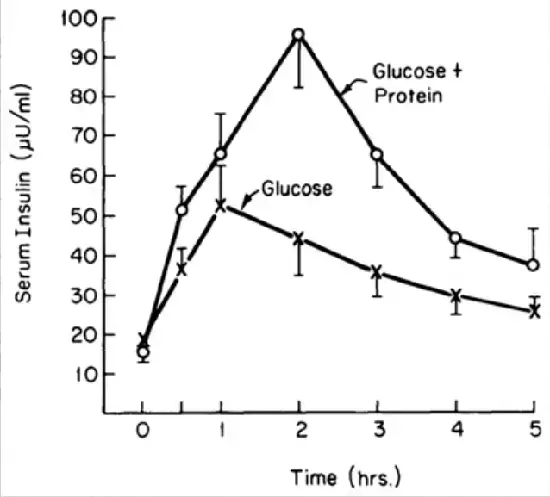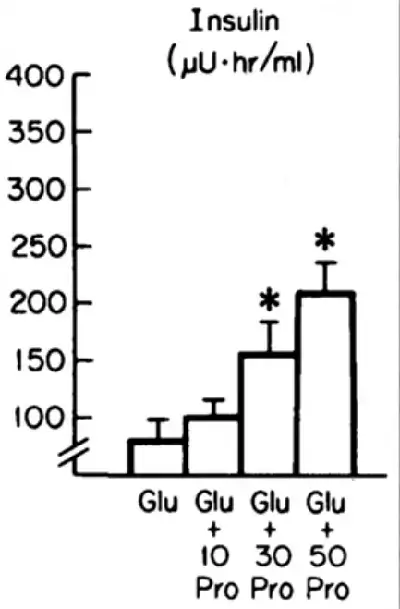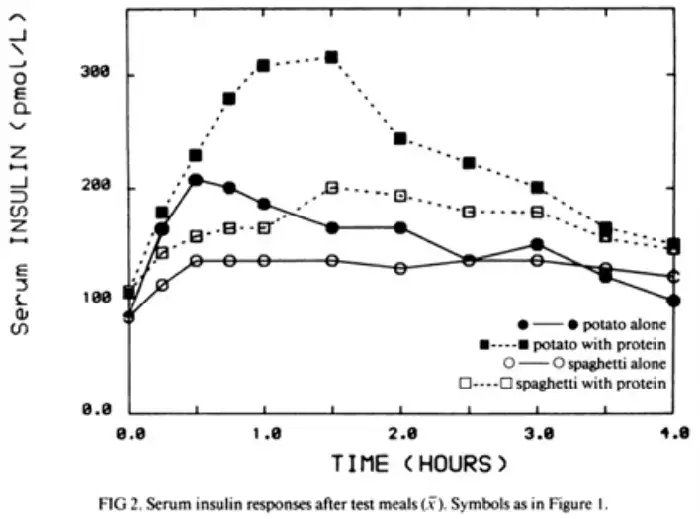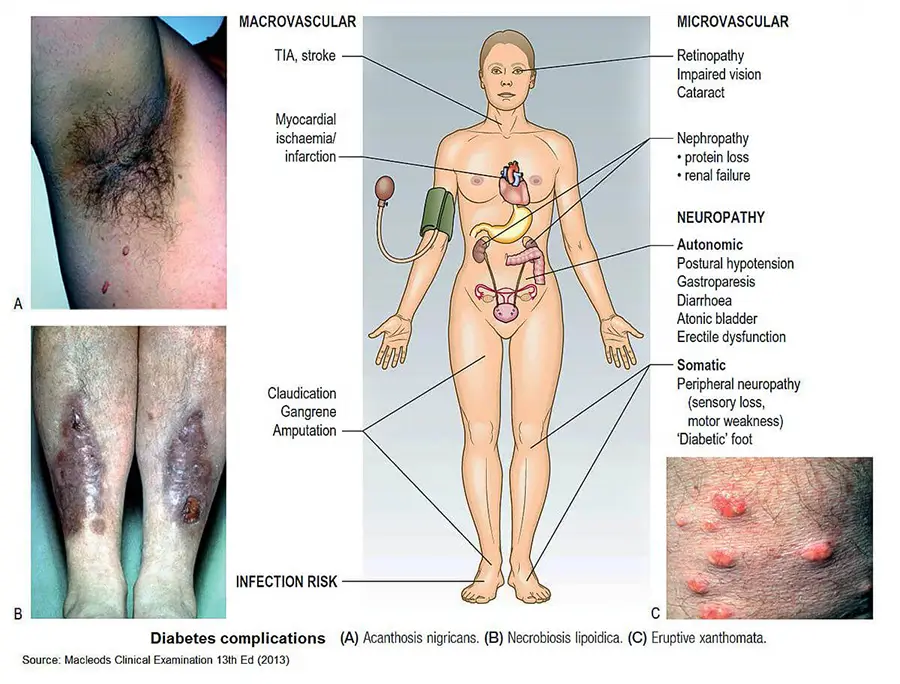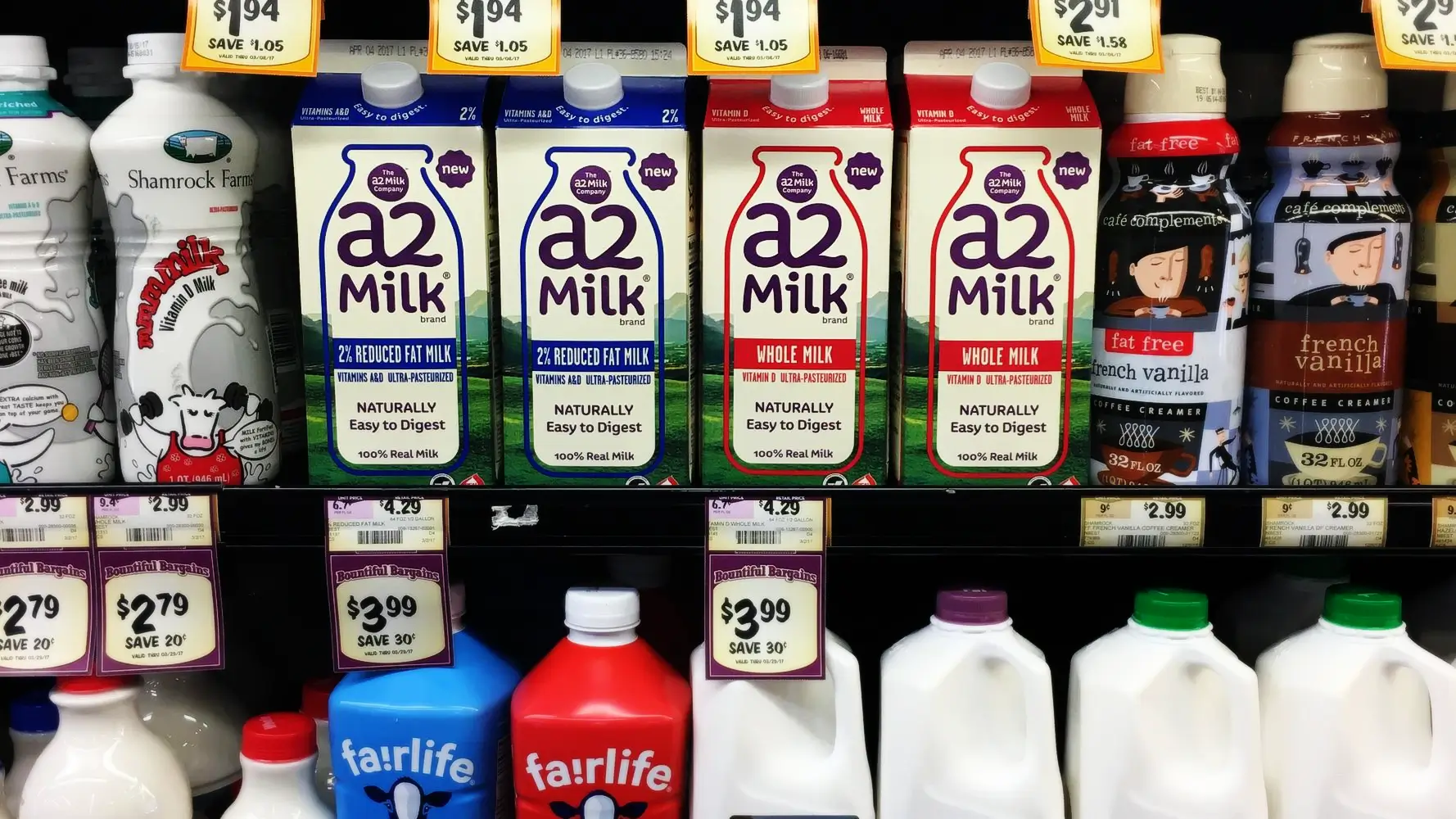Diabetes causes and refined carbohydrates- The vegan argument
People believe that refined carbohydrates are associated with insulin spikes and are one of the diabetes causes. They are right. However, they are also wrong.
Milos Pokimica
Written By: Milos Pokimica
Medically Reviewed by: Dr. Xiùying Wáng, M.D.
Updated June 9, 2023Most people have a belief that refined carbs like white rice are terrible and that refined carbohydrates are associated with insulin spikes and are one of the diabetes causes. They are right.
However, they are wrong at the same time. We will have to look at the entire picture of refined carbohydrates and diabetes.
When rice or grain is refined, the bran is removed. Consumers like nice and soft bread or rice without fiber that can stick between our teeth and taste bad. However, because fiber slows down digestion and absorbs water the carbs in rice without it gets absorbed more rapidly and create an unnatural insulin spike causing an unnatural reaction in our body which by compensation adapts by downregulation of insulin receptors. That is causing insulin resistance and is one of many factors that people with diabetes have to cut out of their diet.
Another factor is intercellular fat which blocks insulin receptor signaling. So refined carbs and sugars cause fast digestion of large and unnatural quantities of calories. Because we have absorption of sugar at a fast rate, we do not burn all of the calories because there are too many in the bloodstream, and some will end up stored as fat. What is worse, as soon as digestion is over, and all the sugars are out of the blood we will start to feel hungry again. Thus lack of fiber is correlated with constant binge eating which then causes obesity and insulin receptors downregulation. Then obesity independently causes all the bad stuff I already wrote about before, and the loop is finished. One small intervention like I do not like sticking bran in my teeth can cause a cascade of effects. A big chunk of the medical community finds that carbs are the cause of all evil and all diseases that we have today. This is the basis of reasoning for diets like the Paleo and Atkins diet. There is no bad logic here. So far.
The industry can sell protein powders and supplements and all the meat they can, especially if the meat is lean. Good old chicken breast and maybe some with healthy fats like tuna. Many people with diabetes that start to adopt this kind of diet may worsen their condition. For example, the modern diabetes epidemic in China and Japan has been linked to white rice consumption which is another half-truth. Consequently, that is why The China Study irritates people.
Rice currently feeds almost half of the world population but how can we settle much lower diabetes rates than just a few decades ago when they ate even more rice? In this study for example (Hu et al., 2012) higher consumption of white rice was correlated with a significantly heightened chance of type 2 diabetes, particularly in Asian (Chinese and Japanese) populations. Also, this is not a small study, with 352,384 participants with follow-up periods ranging from 4 to 22 years. If we analyze this statistically by total population numbers, the dose-response meta-analysis showed that for every meal per day addition of white rice intake, the relative risk of type 2 diabetes was 1.11 meaning an 11% increase in risk. Today China has the same diabetes rate of around 10% as the US which has around 11% despite the seven times less obesity. White rice does not appear to be correlated with obesity and heart attacks and strokes, just diabetes.
However, again if we look at The China Study rural plant-based diets centered around rice were associated with a low risk of diabetes and cancer, and heart disease. This 10% of diabetes prevalence just happened. In the year 2000, China had one of the lowest diabetes rates in the world. This is a dramatic shift that happened in just 20 years.
So what happened?
Well, the same thing happens in every country when the standard of living goes up. Meat consumption went up by an astonishing 40 percent, and rice consumption went down by 30 percent. And now we have a problem. If meat consumption goes up, rice consumption goes down, and diabetes risk goes up, and at the same time, rice consumption independently is correlated with diabetes risk, what is going on? Is it just rice?
Should we eat a more paleo type of diet and cut all the rice? That is what they tell us. Refined carbohydrates are correlated with diabetes and obesity. The answer is simple. What happens is that animal protein is making the rice much worse. This is one study you should go and read (Gulliford et al., 1989). The date of publication was Oct 1989.
Real “new” medical breakthrough. Six noninsulin-dependent diabetic subjects had received meals containing 25 g carbohydrates either as potato or as spaghetti. That is the same meal as white rice. Pure white flour pasta and starch-rich low fiber potato. Then insulin response was measured, and the meals were duplicated including the bonus of 25 g of protein and another one including 25 g of fat. The level of sugar in the blood and insulin responses were measured for 4h after the test meal. The addition of protein increased insulin responses dramatically. This is a “cutting-edge” science to give someone sugar and protein and measure the insulin response.
So there it is. The answer. It is the holy grail of nutrition.
The Protein.
If we look at the chart, we would see that the addition of protein makes potatoes exactly two times worse. From 150 to 300.
We can do it with sugar water too. From 50 to 100. The more meat we add, the worse it gets. When we get to 50 g of protein, we will elicit a surge of insulin that is seriously unnatural and disease-causing. Animal protein significantly potentiates insulin secretion triggered by carbohydrate ingestion. And all along we had been told that diabetes causes are white rice and white flour and sugar. And that is correct partially. The real truth is more complicated. Diabetes causes prime factor is maladaptation to our new diet.
Fiber will lower insulin response like whole wheat pasta but not at the level of 100 percent. Adding meat to any starch is problematic. This combination is unnatural. It is much worse, almost two times worse for insulin response to eat roasted chicken breast with whole wheat bread than the same portion of regular white flour-like Pomodoro pasta with or without oil.
Think about it this way. Does any other animal have regular lunch that consists of different food items?
Carnivores eat only meat. Plant eaters eat only plants. What about omnivores? Do we think that bear is going to catch a fish and then don’t eat it for some period until there is lunchtime so that he can bring that fish to the beehive in order to have dessert afterward?
Even combining different food items at the same meal is 100% unnatural and a modern human invention. And this surge of insulin is maladaptation.
I would ask this. Can we eat just meat without bread? Would we enjoy greasy sausages just by themselves? Would we enjoy just meat from burgers without the buns? It is a mixture of fat and carbohydrates (sugar) that abnormally triggers dopamine signaling in our brains and many other things like in this case abnormal insulin reaction. Combining this with low fiber intake is a recipe for disaster. Combining different food items is not a natural form of eating, but it is pleasurable so we will have to deal with it in the best way we can.
Type 2 diabetes is treatable to some extent. It is actually pretty simple. If we count out the exercise and losing weight number one would be no animal protein. Number two would be fiber. Meaning a lot of it in every meal. If you have to eat meat and have no other choice, then go ahead and eat meat. Just meat. No bread, rice, or any sugar with it. Sugar means regular sugar or fructose or carbs in any form. No salads no nothing. Maybe some cheese. No milk. Milk has sugar or lactose in it.
If you have to eat a combination of sugars and proteins, then it would be a good idea to add some psyllium husk or regular wheat bran and eat spoons of it after a meal. That will slow down digestion to some degree. Psyllium husk has no calories; it is 100 percent fiber. We can use it for diets if we want to bulk up meals in the stomach to give us more saturation but it tastes like cardboard that is liquid.
Number three would be resistant starch meaning beans. If we eat sausages with lots of bread and lots of alcohol we are probably done deal if we have diabetes in the family. When we see the numbers that 1 in 10 people have diabetes, it is an understatement. The actual number is 1 in 3 people in developed countries; just they might not know it because they do not have visible symptoms and insulin resistance is in the range that is known as pre-diabetes. Pre-diabetes is a disease just by itself and would also cause in the long run some adverse effects. It escalates to full-blown diabetes in 1 in 10 cases. CDC estimates that these numbers will still grow primarily on a global scale as the industrialization of the undeveloped regions of the world is taking place. If you have pre-diabetes, the long-term damage, especially to your heart, blood vessels, and kidneys, may already be starting.
References:
- Hu, E. A., Pan, A., Malik, V., & Sun, Q. (2012). White rice consumption and risk of type 2 diabetes: meta-analysis and systematic review. BMJ (Clinical research ed.), 344, e1454. https://doi.org/10.1136/bmj.e1454
- Gulliford, M. C., Bicknell, E. J., & Scarpello, J. H. (1989). Differential effect of protein and fat ingestion on blood glucose responses to high- and low-glycemic-index carbohydrates in noninsulin-dependent diabetic subjects. The American journal of clinical nutrition, 50(4), 773–777. https://doi.org/10.1093/ajcn/50.4.773
Related Posts
Do you have any questions about nutrition and health?
I would love to hear from you and answer them in my next post. I appreciate your input and opinion and I look forward to hearing from you soon. I also invite you to follow us on Facebook, Instagram, and Pinterest for more diet, nutrition, and health content. You can leave a comment there and connect with other health enthusiasts, share your tips and experiences, and get support and encouragement from our team and community.
I hope that this post was informative and enjoyable for you and that you are prepared to apply the insights you learned. If you found this post helpful, please share it with your friends and family who might also benefit from it. You never know who might need some guidance and support on their health journey.
– You Might Also Like –

Learn About Nutrition
Milos Pokimica is a doctor of natural medicine, clinical nutritionist, medical health and nutrition writer, and nutritional science advisor. Author of the book series Go Vegan? Review of Science, he also operates the natural health website GoVeganWay.com
Medical Disclaimer
GoVeganWay.com brings you reviews of the latest nutrition and health-related research. The information provided represents the personal opinion of the author and is not intended nor implied to be a substitute for professional medical advice, diagnosis, or treatment. The information provided is for informational purposes only and is not intended to serve as a substitute for the consultation, diagnosis, and/or medical treatment of a qualified physician or healthcare provider.NEVER DISREGARD PROFESSIONAL MEDICAL ADVICE OR DELAY SEEKING MEDICAL TREATMENT BECAUSE OF SOMETHING YOU HAVE READ ON OR ACCESSED THROUGH GoVeganWay.com
NEVER APPLY ANY LIFESTYLE CHANGES OR ANY CHANGES AT ALL AS A CONSEQUENCE OF SOMETHING YOU HAVE READ IN GoVeganWay.com BEFORE CONSULTING LICENCED MEDICAL PRACTITIONER.
In the event of a medical emergency, call a doctor or 911 immediately. GoVeganWay.com does not recommend or endorse any specific groups, organizations, tests, physicians, products, procedures, opinions, or other information that may be mentioned inside.
Editor Picks –
Milos Pokimica is a doctor of natural medicine, clinical nutritionist, medical health and nutrition writer, and nutritional science advisor. Author of the book series Go Vegan? Review of Science, he also operates the natural health website GoVeganWay.com
Latest Articles –
Plant Based News
-
Is Decaf Coffee Really Unsafe? What You Need To Know
on April 23, 2024
-
How To Make This Gut-Friendly Miso Mushroom Risotto
on April 23, 2024
-
Brazil Is Expanding Its Beef Exports – What Does This Mean For The Amazon?
on April 23, 2024
-
Dairy And Oat Blended Milk Sparks Backlash
on April 23, 2024
-
Try This Spinach Arugula Salad With Candied Pecans And Apples
on April 22, 2024
-
‘Transfarmation’ Stories: The Farmers Switching From Animals To Crops
on April 22, 2024
-
This Start-Up Is Making Iron In Plant-Based Meat Easier To Absorb
on April 22, 2024
Top Health News — ScienceDaily
- Don’t be a stranger — study finds rekindling old friendships as scary as making new oneson April 23, 2024
Psychologists have found that people are as hesitant to reach out to an old friend as they are to strike up a conversation with a stranger, even when they had the capacity and desire to do so.
- Infected: Understanding the spread of behavioron April 23, 2024
A team of researchers found that long-tie connections accelerate the speed of social contagion.
- Researchers create artificial cells that act like living cellson April 23, 2024
Researchers describe the steps they took to manipulate DNA and proteins — essential building blocks of life — to create cells that look and act like cells from the body. This accomplishment, a first in the field, has implications for efforts in regenerative medicine, drug delivery systems and diagnostic tools.
- Innovative microscopy demystifies metabolism of Alzheimer’son April 23, 2024
Using state-of-the-art microscopy techniques, researchers have shed new light on the underlying mechanisms driving Alzheimer’s disease.
- Study compares salmonella rates in backyard, commercial poultry farm sampleson April 23, 2024
Researchers find less Salmonella on backyard poultry farms. But concerns remain about the prevalance of multidrug-resistant bacteria on both large and small farms.
- In the brain, bursts of beta rhythms implement cognitive controlon April 23, 2024
Bursts of brain rhythms with ‘beta’ frequencies control where and when neurons in the cortex process sensory information and plan responses. Studying these bursts would improve understanding of cognition and clinical disorders, researchers argue in a new review.
- Magnetic microcoils unlock targeted single-neuron therapies for neurodegenerative disorderson April 23, 2024
Researchers deploy an array of microscopic coils to create a magnetic field and stimulate individual neurons. The magnetic field can induce an electric field in any nearby neurons, the same effect created by an electrode but much more precise. They used an array of eight coils, which combined can induce electric fields using much less current per coil, and employed soft magnetic materials, which boost the magnetic strength of the coils. The researchers constructed a prototype of their coil […]
PubMed, #vegan-diet –
- What’s cooking? The normalization of meat in YouTube recipe videos consumed by South Asian British Muslimson April 23, 2024
Muslim consumers in the UK eat more meat than the national average. Individuals from ethnic minority backgrounds, particularly South Asian communities, experience poorer health outcomes, including diabetes and cardiovascular disease, associated with meat consumption. According to a YouGov survey, British Pakistani and Bangladeshi consumers use television cookery programs and social media (particularly YouTube) as their main digital sources of dietary information. Against this background, this…
- Nutrition: Micronutrientson April 22, 2024
Micronutrients are nutrients the body needs in small quantities, such as vitamins and minerals. Micronutrient deficiencies can occur when an individual is restricting calorie intake for weight loss or management, not consuming an adequate amount of food to meet energy requirements due to poor appetite or illness, eliminating one or more food groups from the diet on a regular basis, or consuming a diet low in micronutrient-rich foods despite adequate or excessive energy intake. Patient groups […]
- From Tofu to T-Bones: How Vegan and Ketogenic Diets Shape Our Immune Defenseson April 22, 2024
Link et al. conducted a controlled study comparing the impacts of ketogenic and vegan diets on energy intake and immune function in humans. Deep -omics analyses revealed distinct effects of each diet on the immune system, including changes in cell populations and blood transcriptomes indicative of diet-induced shifts between adaptive and innate immunity. The study highlights the potentially significant, rapid impact of diet on immune function and health.
- Vitamin B12 deficiency and neuropsychiatric symptoms in Lebanon: A cross-sectional study of vegans, vegetarians, and omnivoreson April 17, 2024
CONCLUSION: Vitamin B12 deficiency in Lebanon is notably high and is linked to an increased risk of developing depression, generalized anxiety disorder, insomnia, and paresthesia. Vegans/vegetarians exhibit a higher susceptibility to developing depression compared to omnivores, whereas the risk of developing insomnia, generalized anxiety disorder and paresthesia was statistically insignificant when comparing vegans/vegetarians to omnivores.
- Outbreak of Listeriosis Associated with Consumption of Vegan Cheeseon April 17, 2024
No abstract
Random Posts –
Featured Posts –

Latest from PubMed, #plant-based diet –
- Lifestyle Interventions in a Patient Identified as Super-Super Obese With a Body Mass Index of 90.5by Ghadeer Al Ghareeb on April 22, 2024
Obesity is a growing global health concern. Saudi Arabia is experiencing a higher prevalence of obesity compared to the globe. This case report focuses on a 38-year-old female with a body mass index (BMI) of 90.5 kg/m², prediabetes, and obstructive sleep apnea who successfully underwent a lifestyle modification process resulting in remarkable weight loss. The patient’s past unsuccessful attempts at weight loss had left her with a reluctance to try again initially. A multidisciplinary team…
- Mitigating digestive disorders: Action mechanisms of Mediterranean herbal active compoundsby Abdalsalam Kmail on April 22, 2024
This study explores the effects of the Mediterranean diet, herbal remedies, and their phytochemicals on various gastrointestinal conditions and reviews the global use of medicinal plants for common digestive problems. The review highlights key plants and their mechanisms of action and summarizes the latest findings on how plant-based products influence the digestive system and how they work. We searched various sources of literature and databases, including Google Scholar, PubMed, Science…
- Effects of supplementing coated methionine in a high plant-protein diet on growth, antioxidant capacity, digestive enzymes activity and expression of TOR signaling pathway associated genes in gibel…by Yingying Du on April 22, 2024
This study explored the impacts of supplementation of different levels of coated methionine (Met) in a high-plant protein diet on growth, blood biochemistry, antioxidant capacity, digestive enzymes activity and expression of genes related to TOR signaling pathway in gibel carp (Carassius auratus gibeilo). A high-plant protein diet was formulated and used as a basal diet and supplemented with five different levels of coated Met at 0.15, 0.30, 0.45, 0.60 and 0.75%, corresponding to final […]
- Cow milk is an important source of iodine for prenatal health, and switching to plant-based milk can lead to iodine insufficienciesby Hallie Lundquist on April 22, 2024
Iodine insufficiencies are common among many populations, particularly pregnant women. One of the main functions of iodine is making thyroid hormone. The 2 main hormones that iodine influences are triiodothyronine and thyroxine. Thyroid hormone affects metabolism of most tissues. For the average adult, the recommended dietary allowance (RDA) for iodine is 150 µg. During certain stages of life, such as pregnancy, lactation, and infancy, the importance of iodine is even greater as it supports…
- An overview of fermentation in the food industry – looking back from a new perspectiveby Shahida Anusha Siddiqui on April 22, 2024
Fermentation is thought to be born in the Fertile Crescent, and since then, almost every culture has integrated fermented foods into their dietary habits. Originally used to preserve foods, fermentation is now applied to improve their physicochemical, sensory, nutritional, and safety attributes. Fermented dairy, alcoholic beverages like wine and beer, fermented vegetables, fruits, and meats are all highly valuable due to their increased storage stability, reduced risk of food poisoning, and…
- Nutrition: Macronutrientsby Cynthia Cheng on April 22, 2024
Macronutrients are nutrients the body needs in large quantities, such as fats, carbohydrates, fiber, protein, and water. The exact quantity of macronutrients needed for an individual depends on multiple factors such as height, weight, sex, physical activity level, and medical conditions. For adequate intake, the Dietary Guidelines for Americans, 2020-2025 (DGA) recommend an overall healthy eating pattern rather than specific macronutrient amounts. A healthy eating pattern includes consumption […]



